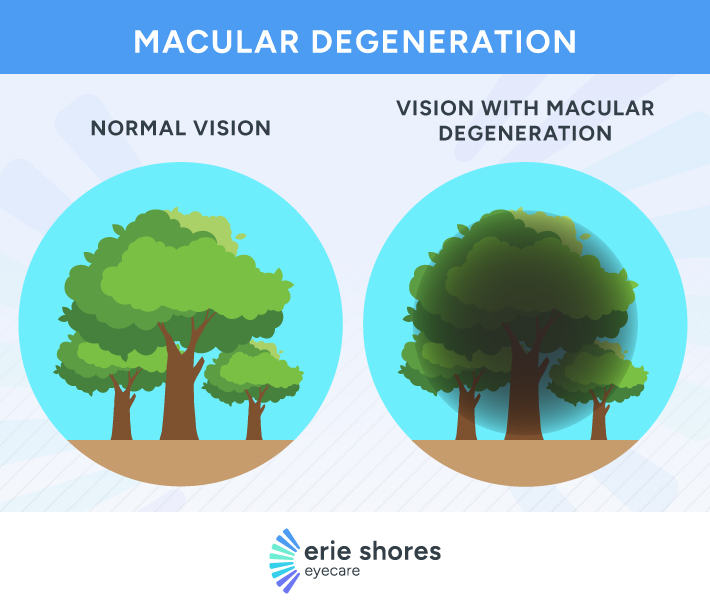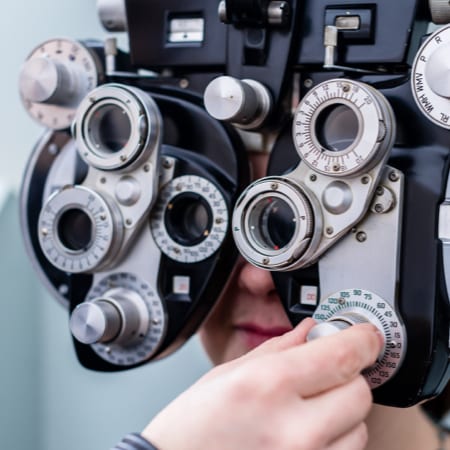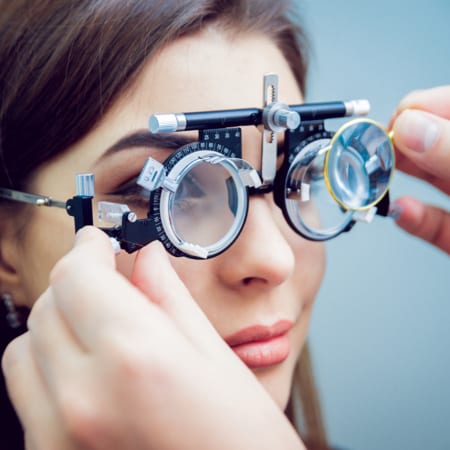Vision is one of our most precious senses, yet many of us take it for granted—until issues like macular degeneration arise. If you or a loved one has been diagnosed with macular degeneration, you’re likely wondering what caused the condition and whether it could affect other family members.
Macular degeneration does have a genetic component, alongside other common risk factors, like age, smoking, and high blood pressure. Although you could be genetically predisposed to having macular degeneration, there is no guarantee that you will develop the condition. Regular comprehensive eye exams can help determine if you have macular degeneration.
What Is Age-Related Macular Degeneration?
Age-related macular degeneration (AMD), is an eye condition that affects the macula, the retina’s central portion. The macula is responsible for sharp, central vision. It helps you perform tasks like reading, recognizing faces, and driving.
There are two primary types of macular degeneration:
- Dry AMD (the most common form) develops gradually as the macula thins with age.
- Wet AMD (less common but more severe) occurs when abnormal blood vessels grow under the retina, leading to rapid vision loss.
AMD doesn’t cause complete blindness but can significantly impair central vision, affecting daily tasks and quality of life.

Does Macular Degeneration Run in Families?
Yes, genetics play a role in macular degeneration. Research has shown that individuals with a family history of AMD are more likely to develop the condition themselves.
Specific gene mutations—such as variations in the group of genes called cascade on chromosome 1 and the group of ARMS2/HTRA genes—have been linked to an elevated risk of AMD. If your parent or sibling has macular degeneration, your risk of developing the condition may increase up to 50%. You must share your family health history with your eye doctor to assess your risks accurately.
Genetics isn’t the sole risk factor for developing AMD. Lifestyle choices and environmental factors also contribute, meaning that even if you carry the genes associated with AMD, proactive measures can make a difference.
At What Age Is Macular Degeneration Most Likely to Develop?
AMD is most commonly associated with aging, typically developing after the age of 55. The prevalence of AMD then tends to increase significantly thereafter.
For this reason, regular eye exams become even more critical as people age. They allow early detection and intervention to slow the progression of disease.
What Causes Macular Degeneration?
Macular degeneration is a multifactorial disease, meaning it has a mix of genetic, lifestyle-related, and environmental causes. Key contributors include:
- Aging: The risk of AMD increases as we age, particularly after 55.
- Genetics: Mutations in specific genes can elevate your risk if you have a family history of the disease.
- Poor Diet: Diets high in saturated fats and low in antioxidants can damage the macula over time.
- Smoking: Smoking is one of the strongest modifiable risk factors for AMD and can double your likelihood of developing the disease.
- Obesity: Obesity increases the progression risk for AMD, particularly its more severe form, wet AMD.
- UV Light Exposure: Long-term exposure to UV rays without eye protection may contribute to macular damage.
Understanding these causes can empower you to take steps toward minimizing your risk.

Can Stress Cause Macular Degeneration?
While stress itself isn’t a direct cause of AMD, emerging research suggests that chronic stress may indirectly contribute to eye health issues. Elevated stress levels can exacerbate underlying health conditions like high blood pressure and cardiovascular disease—both of which are risk factors for AMD.
Reducing stress through mindfulness or relaxation techniques can positively impact not only your overall well-being but also your eye health.
How Can You Prevent Macular Degeneration’s Progress?
While there’s no cure for AMD, you can take several steps to slow its progression and protect your remaining vision:
- Schedule Regular Eye Exams: Early detection is crucial. A comprehensive eye exam can detect AMD in its earliest stages.
- Adopt a Nutrient-Rich Diet: Foods high in vitamins C and E, zinc, and omega-3s (such as leafy greens, citrus fruits, nuts, and fish) can support your eye health.
- Stop Smoking: Quitting smoking significantly reduces your risk of AMD progression.
- Wear Sunglasses: Choose sunglasses that block 100% of both UVA and UVB rays.
- Maintain a Healthy Lifestyle: Regular exercise and a balanced diet can reduce your risk of conditions linked to AMD.
- Consider Supplements: Supplements may benefit individuals at risk of AMD.
For tailored advice and treatment options, consult an eye care professional specializing in macular health.
Can You Go Blind from Macular Degeneration?
Macular degeneration does not cause complete blindness as it primarily affects your central vision while leaving peripheral vision intact. However, central vision loss can be severe enough to impact daily activities like reading, driving, and recognizing faces.
Wet AMD progresses faster and is more likely to lead to significant visual impairment. That’s why timely diagnosis and proper management are so critical.
Is Macular Degeneration Permanent?
Unfortunately, macular degeneration is a permanent condition. However, lifestyle changes, nutritional support, and targeted treatments can often slow or manage its progression.
If caught early, individuals with AMD can maintain their quality of life and independence for a longer time. Working closely with your eye doctor helps ensure you’ll have the support and resources to manage the condition.
Take Control of Your Eye Health with Erie Shores Eyecare
Living with macular degeneration—or having a family history of the condition—can seem daunting, but knowledge is power. Understanding the hereditary risks, causes, and ways to slow macular degeneration’s progression can help preserve vision.
If you’re concerned about macular degeneration or other hereditary eye conditions, don’t wait. Our qualified team at Erie Shores Eyecare is recognized as an AMD Centre of Excellence by the Macular Degeneration Association, and we are dedicated to helping you on your AMD journey. Schedule a personalized appointment with us today to get started.

















